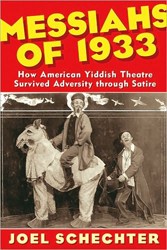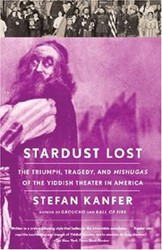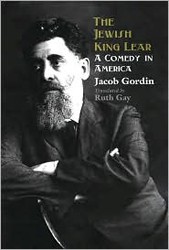I Just Can’t Live Without My Radio
By Ari Y. Kelman
I rediscovered radio one summer while working in my aunt’s law firm. My job was to sort documents for a massive case, and to keep myself entertained, all I had was a radio (this was the days before ipods). So I listened (to WFUV, mostly), and I found that radio played a pretty exceptional selection of music all day. For free. That same summer, I was preparing to teach a course at a local college on American popular music, and I learned of radio’s role in creating audiences for rock and roll outside of urban areas. My rediscovery of radio was only half the story.
As far as Yiddish went, I knew almost nothing. In fact, when I decided to write about Yiddish radio, I discovered that the only Yiddish I knew consisted of synonyms for “wild little boy.” But, at the suggestion of a friend, I went to the New York Public Library, requested a roll of the English language Jewish Daily Forward on microfilm, and found what I was looking for. The newspaper brimmed with information about radio, including daily listings, columns, and advertisements. I found something, but I did not know exactly what.
What immediately spoke to me — even before I learned to understand what I was hearing — was the possibility that radio could take on a host of new meanings if we placed an ethnic minority at the center of a discussion of a mass medium. To do so would mean that the oft-romanicized “Golden Age of Radio” spoke Yiddish, too. It would mean learning to listen to the multiple languages of American media history. And, it meant re-assessing the processes of Americanization.
The rise of Yiddish radio in the U. S. coincided with the end of Jewish immigration, and Yiddish radio provided a rather strange soundtrack for Americanization, complete with rabbis sermonizing, cantors singing, amateurs performing, actors melodramatizing, and advertisers advertising. Insofar as Yiddish radio did participate in a conversation about Americanization, it did so within an intensely Jewish context. This meant that Americanization did not just happen to Jewish immigrants; it was something that they willingly undertook and actively shaped. To talk in Yiddish about what it meant to be an American dramatically changed the tone and tenor of the conversation, and to do so on radio meant changing the definitions of audience and community, as well.
In this context, Americanization appeared to be a powerfully generative process for American Jews and even for Yiddish culture. This provisional finding seemed counter-intuitive to me. But it also seemed too curious to ignore.
So, I learned Yiddish one summer at YIVO, and spent the next few years reading old Yiddish newspapers, looking through archives, listening to whatever recordings I could get my hands on, and traveling around the country trying to track down traces of this phenomenon. I spoke with whomever would speak with me, sharing stories in kitchens and over glasses of scotch. I scoured advertisements, handbills, photographs, scrapbooks, and scripts looking for echoes of this vibrant aural culture.
Finding it was one thing, making sense of it was another. What did all these programs and advertisements mean? How could station owners both encourage the Americanization of their audience and do so in Yiddish? Why did amateurshow performers choose Yiddish songs to sing, even when they did not speak Yiddish? Who were the “lady cantors,” and how did people react to them? Why weren’t there Yiddish westerns, mysteries, and science fiction programs? Why did immigrant Jews tune in to Yiddish programs, if they could listen to English programs instead?
Answering these questions meant learning to listen to the tensions that they framed. Born of the information I had collected, the questions did not lend themselves to simple answers. Instead, they asked about processes, dynamics, symbiotic relationships, and cultural choices that were not easily reconciled. In other words, to write this book meant that I could not offer some broad, synthetic interpretive gesture that would explain the entire phenomenon as if it were a metaphor or a painting. To write this book, I was going to have to learn to listen to the culture of radio better than I ever had before.
Interview
By Michael Wex
Ari Y. Kelman, author of Station Identification, was a finalist for the 2009 Sami Rohr Prize for Jewish Literature. He is an assistant professor of American Studies at UC Davis.
Michael Wex: Clever title, Station Identification. How’d you come up with it and what’s it intended to convey?
Ari Kelman: The title was suggested by my ex-wife, who was still my wife at the time. “Station Identification” captures an important register of the book’s central conversation, which focuses on the relationship between Yiddish radio broadcasting and negotiations over Jewish collective identity. And, as an old radio “catchphrase,” it seemed to capture two dimensions of the book: First, “station identification” is what the stations had to do to identify themselves to audiences and regulators. Second, it echoes with overtones of the ways in which audiences identified with the stations to which they listened.
MW: What came first for you, an interest in Yiddish or in Yiddish radio? What is it about Yiddish radio that so captivated you?
AK: It was an interest in radio. I was preparing to teach a class about rock and roll, and I got interested in radio’s role in bringing rhythm and blues to white suburban and rural audiences. I began reading about radio in general, and wondered if there was any radio for immigrants. So, I went to the New York Public Library, and pulled a reel of the Forward on microfilm. I didn’t even speak Yiddish at the time, but I spoke Hebrew and a little German, so I could read enough to recognize that the Forward was printing daily radio listings, and had a weekly column about radio, too. Three things captivated me right from the beginning. First, that the story of Yiddish radio (or that of any “foreign language radio”) is entirely absent from American radio history. Listening to Yiddish radio provided a way to crack open those histories and ask: How does the presence of a minority population change our understanding of mass media? Second, so much writing about Yiddish culture focused on literature and theater, and the absence of radio (as an almost entirely American phenomenon) seemed like a big omission, insofar as its growth coincided with declines in newspaper readership and theater attendance. Third, and perhaps most importantly, I was intrigued by the notion that the same appliance (the radio) brought mass, popular entertainment into the homes of Jewish immigrants in both English and Yiddish. How does this capture a different aural history of American Jews than those we already have?
MW: How’d you get to the stuff, i.e., gain access to the shows themselves? Were you able to understand everything that you had to listen to?
AK: The majority of my sources were print— newspapers, scripts, listener letters, station notes, contracts, sheet music, and so on. For a variety of reasons, there are not many surviving recordings. I listened to everything I could — a few hundred hours of recordings at YIVO, the NYPL, The Library of Congress (Smithsonian Folkways) and a handful of recordings I obtained through private collectors— and there were some that I could not understand. Some were hampered by poor recordings, some people just spoke too quickly for me to understand.
MW: What do you think the outlook is for continued Yiddish — as distinct from more generally Jewish — influence on American culture?
AK: Given the rise in scholarship on and in Yiddish, it is almost impossible to imagine anyone working on American Jewish history or American Jewish culture to neglect or avoid Yiddish and its influences. I’ll never forget my first visit to the National Yiddish Book Center, which really impressed upon me (this, while I was learning Yiddish at YIVO) the volume, breadth, and diversity of Yiddish literary expression of all kinds. Each time I return to the sources, there is so much still to be explored, understood, written about. It boggles my mind that there’s still no good book about the Forward or about the Yiddish press generally.
MW: What are you working on now? What’s next?
AK: I’m working on a few different projects. I’m writing a book on evangelical Christian worship music, which is more contemporary than historical, and a book about music compilations. I know that to the untrained ear this sounds like a real departure from Station Identification, but I see it as an extension of the themes of sound, community, and audience that began to surface for me while listening to Yiddish radio. I’m also working on an essay about “Fiddler on the Roof,” which has let me go back and read Sholom Aleichem in Yiddish, which is a real treat.
Author of Born to Kvetch, Just Say Nu, and How To Be A Mentsh, Michael Wex grew up in Alberta, where Yiddish radio was an unheard of luxury. He has taught at the University of Toronto and the University of Michigan, and was once a regular contributor to the Forward Hour. His novel, The Frumkiss Family Business, will be published by Knopf Canada in September.
Maron L. Waxman, retired editorial director, special projects, at the American Museum of Natural History, was also an editorial director at HarperCollins and Book-of-the-Month Club.





